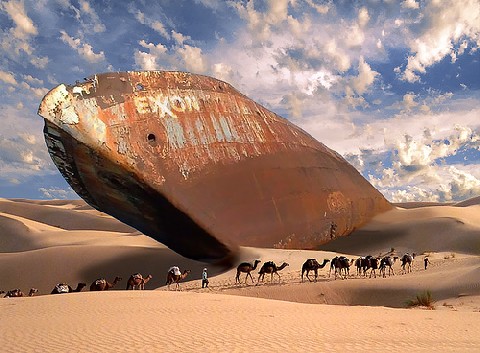The 10 Commandments – Guidelines to Surviving in a Post Peak Oil World
4 Oct, 2011 02:56 pm
The transformation to a lower-energy lifestyle is essential and complex in the face of peak-oil. Here are a few suggestions of some of the more immediate matters.

(1) The real problem is that our society is based around the car. This is particularly so in the U.S., where it is (or has become) necessary to travel over significantly greater distances than in the U.K., and in Europe generally. Fuel is cheap in the U.S., and if it were not the economy would grind to a halt. I have toured extensively in the U.S., giving lectures on environmental subjects, and indeed when I was scheduled to cover 10 venues in 14 days (on one trip) I needed to fly between almost all of them (except in Houston where I had two engagements in the same city), and was amazed at how much competition exists between airlines with the consequence that I could cover about 1,000 miles for around £30.00 ($46.80).
The standard price would be probably four times that in the U.K., say from London to Edinburgh, which is less than 1,000 miles, but you gather my drift. As I have stressed before, in no way are cars part of the solution to the problem of sustainable living in the oil-poor era, which I predict we will see begin to emerge within about a decade from now. I have "done the math", and it seems clear enough that the massive amounts of fuel that we currently use cannot be replaced gallon-for-gallon by biodiesel, biobutanol, bioethanol or indeed biohydrogen - there just isn't enough arable land to grow the crop to make any of this stuff on a sufficient scale, certainly not if we want to keep growing food. A rise in car-share schemes would be a useful first step.
(2) That brings me onto the next vital issue - food production. All farming will necessarily become organic. At the outset, let me say that I realise that growing food organically (fertilized by plant mulch and animal manure, and without using chemical pesticides) requires more land than modern forced agriculture does. However, since the means to force it - pesticides and chemical fertilizers - are made from oil and natural gas, once these begin to deplete, then there will be no alternative. Some say that if Cuba could do it, as they did when the former U.S.S.R. curtailed their supplies of oil, fertilizer and pesticides, then so can we. This is good thinking, however, Cuban society is of the necessarily localised kind based around community farms supplying local small populations. So that's where we are heading. Rock-phosphate fertilizer is another issue, since its production appears to have also peaked and thus there is a real incentive to recycle N and P from agricultural run-off and from human and animal waste, which would also address the problem of eutrophication and algal blooms. Methods of Regenerative Agriculture and Permaculture need also to be introduced as a means for reducing the inputs of artificial fertilizers, pesticides and freshwater into farming.
(3) Many urban conurbations can only support a small number of their very large populations. A city the size of London is a good example, with around 10 million people depending on where you draw the borders, which would pose a considerable exercise in relocating most of that number since London itself has insufficient arable land for the purpose of sustaining so many.
(4) Transportation is, of course, a major issue, beyond the availability of the "car". Virtually all goods on shop shelves are imported - many from other countries, sometimes across the world, and certainly over considerable distances within these shores. Most of that will have to go, and local production will become the norm. Hence there will be an inevitable rise in local economies.
(5) This is a thorny matter, because it means that the accepted mechanisms of retail trade will need overhauling. Massive chain-retail industries, say McDonalds and many others, will have to to work on the local scale if they are to survive. Hence if we had a McDonalds in the village of Caversham, the burgers it sold would be made from locally farmed beef, not imported from Argentina, say. Everything will hence become more expensive, as the monopoly advantage of bulk-buying on an unimaginable scale will be lost. All such mechanisms rely on cheap oil and it is precisely the loss of that which we are planning for.
(6) Certainly in the U.K., once the world leader in engineering, we now manufacture relatively little because we can buy it more cheaply e.g. from China. However, the cost of imports will necessarily soar, and so if we want particular items (even cars), they will have to be made certainly within the U.K. The same argument applies for the U.S., and maybe even more so. Indeed, there is a certain joy to be had in the death of faceless corporate industries who we believe don't really care too much about individuals. Smaller local businesses do, because their livelihood depends on it. The developing world may be hard-hit, however, if the West no longer wants to buy their goods, and that development may atrophy - but it must in any case, since all of it is underpinned by the declining source of world oil supplies.
(7) It may be that the age of "consumerism" per se, is drawing to a close. This will impact on everything, and hard. We will never re-experience the oil-extravaganza of the 20th Century. Hence that kind of manufacture and supply will make its swansong. How indeed we will make anything in the future is a good question since oil and gas have served as both a basic manufacturing material and a fuel for industry. It is certain, however, that an emphasis on more essential items (warm clothes and pots and pans, say) will matter much more than devising novel gadgets for mobile-phones beyond their inaugural purpose of just talking to somebody. The entertainment industry, tourism and the service sector generally will begin to wrap-up.
(8) Having seen a huge reorganisation of education in the U.K., we will see far more, and maybe a return to some of the original technical colleges that have now become universities, and this might end much of the current pretence that the nation is better educated than ever before. With the fall of the intrinsic manufacturing industry (which was based on first coal and then oil), and high levels of unemployment in the 1980?s, a whole generation of new universities was established and a general re-jigging of the system to fit the bums-on-seats funding policy. Hence some universities will offer whatever courses can swell their entry numbers, and so we see a rise in pharmacy while the real science of chemistry has declined sharply. The title "professor" needs to be looked at too, when in some universities a professor (that's "Full Professor" in the U.S., not lecturer) may have no publications in the subject he is allegedly a professor of!
How indeed can such an individual profess? Real knowledge and real levels of literacy and numeracy should be instilled from school levels and this does not seem to be the case even though we have never had more "university graduates". Indeed some companies e.g. Zeneca, in exasperation, are now training their own staff, taking them at age 16, rather than training poorly educated graduates. This is indeed how industry used to gain its ultimately senior staff (they worked their way up), and it would avoid the mandatory "student debt" that has been enforced on the young by vastly expanding the numbers of university places but then removing the maintenance grant system, which now would be absurdly expensive for the government to fund. My novel "University Shambles" satirises some of the absurdities that have come about in the hastily expanded British university system http://universityshambles.com
(9) The high-tech medical system will also be unable to survive. Most of modern medicine depends on oil and gas, at the simplest level to get hospital staff to work in the mornings. Even bandages and dressings, drugs and high-tech equipment such as heart monitors and devices to jolt an arrested heart back into life depend on oil as a manufacturing feedstock and electricity to run them. There will likely be less cosmetic surgery, and organ transplants too. The NHS in the U.K. was set-up primarily to fight infectious diseases, and this might be more effectively done working on a smaller community scale, than in confronting a highly mobile world population with the means to transport diseases too. That knowledge gained in the successful control of much infection should be prized and taught as part of the new physicianship.We may see the return of the "cottage hospital" which like a local farm, attends to the needs of a fairly small community, rather than massive city hospitals and health centres. Preventative medicine will come to the fore, since prevention is indeed much more effective (and less demanding of resources) than cure.
(10) This, the final item is a round-up of what has already been alluded to. Life will necessarily become more locally focussed. If people are unable to move around so freely, they will tend to stay where they are. A likely successful outcome for we humans in the imminent oil-poor era will be met through thinking and planning on the scale of small communities. Some regions will naturally have certain advantages over others and disadvantages too, e.g. whether there is access to transport/energy from a river or plenty of crop-land or woodland. That said, the internet should not be lost, otherwise we will become hidden from one another in small isolated community pockets, and that would be a seriously retrograde step. Optimistically, this may be a good time to think about setting up your own local business in wherever it is you choose to settle. Now that is an important choice to make, as you may find yourself stuck there if you don't like it!
-
12/12/12
“Peak Oil” is Nonsense… Because There’s Enough Gas to Last 250 Years.
-
05/09/12
Threat of Population Surge to "10 Billion" Espoused in London Theatre.
-
05/09/12
Current Commentary: Energy from Nuclear Fusion – Realities, Prospects and Fantasies?
-
04/05/12
The Oil Industry's Deceitful Promise of American Energy Independence
-
14/02/12
Shaky Foundations for Offshore Wind Farms







 Read more
Read more
Where organic agriculture is significantly less productive is per farmer -- organic methods take at least 30% more labor input than conventional. In a world of increasing unemployment, that is not necessarily a drawback.